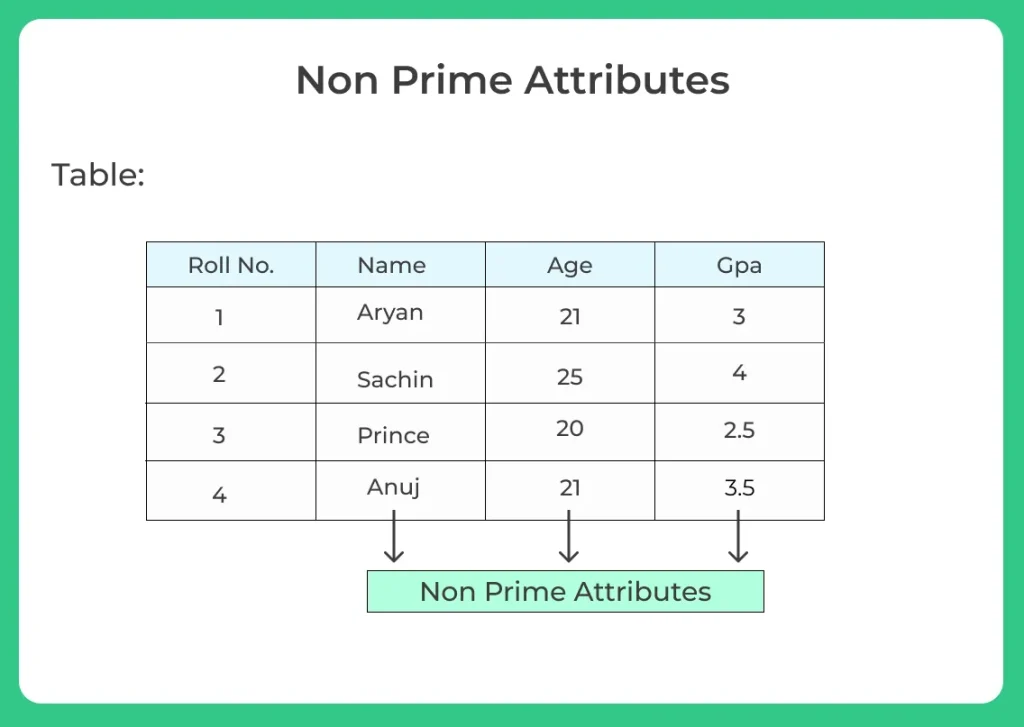Functional Dependencies
What is a Functional Dependency?
If one attribute is determined by another attribute in a DBMS system then it is a functional dependency.
In this article, we will learn about Functional Dependencies in DBMS.

Examples :
Consider the following table:
| ID | NAME | AGE | CITY | PHONE_NO |
|---|---|---|---|---|
| 67 | Luke | 22 | Delhi | 8353355366 |
| 68 | Haley | 19 | Noida | 7323598665 |
| 69 | Luke | 21 | Mumbai | 8656864365 |
- [ID] : Every individual will have a unique ID so it is a prime attribute.
- [NAME] : Two different persons might have same name, so it is non prime attribute
- [AGE] : Two different persons might have same age, so it is non prime attribute
- [CITY] : Two different persons might be living in the same city, so it is non prime attribute
- [PHONE_NO] : No two persons will have same phone number, so it is not a non prime attribute
Rules of Functional Dependencies
- Reflexive rule :. If A is a set of attributes and B is subset of A, then A holds a value of B.
- Augmentation rule : When A -> B holds, and C is attribute set, then AC->BC also holds. That is adding attributes which do not change the basic dependencies.
- Transitivity rule : This rule is very much similar to the transitive rule in algebra if A->B holds and B->C holds, then A->C also holds. A->B is called as functionally that determines B.
Multivalued Dependency
- Multivalued dependency occurs in the situation where there are multiple independent multivalued attributes in a single table.
- A multivalued dependency is a complete constraint between two sets of attributes in a relation.
Example:
| Car_Model | Manufactre_Year | Color |
|---|---|---|
| H001 | 2017 | Metallic |
| H001 | 2017 | Green |
| H005 | 2018 | Metallic |
| H005 | 2018 | Blue |
| H010 | 2015 | Metallic |
| H033 | 2012 | Gray |
- In this example, Manufacture_year and colour are independent of each other but dependent on Car_model. In this example, these two columns are said to be multivalue dependent on Car_model.
- This dependence can be represented like this:
- Car_model -> Manufacture_year
- Car_model-> colour
Trivial Functional dependency
- The Trivial dependency is a set of attributes which are called a trivial if the set of attributes are included in that attribute.
- A->B is a trivial functional dependency if B is a subset of A.
Example:
| Stu_ID | Stu_Name |
|---|---|
| 3015 | Priya |
| 1402 | Rajesh |
| 2109 | Ganga |
In the above table,{Stu_ID, Stu_Name} -> Stu_ID is a trivial functional dependency as Stu_ID is a subset of {Stu_ID,Stu_Name}.
Non trivial functional dependency
- In a relationship, if attribute B is not a subset of attribute A, then it is considered as a non-trivial dependency.
- A nontrivial dependency occurs when A->B holds true where B is not a subset of A.
Example:
| Stu_ID | Stu_Name | Marks |
|---|---|---|
| 3015 | Priya | 97 |
| 1402 | Rajesh | 83 |
| 2109 | Ganga | 89 |
- {Stu_ID} -> {Stu_Name} (if we know the Stu_ID, we knows the Stu_Name)
- But Stu_Name is not a subset of Stu_ID, and hence it’s non-trivial functional dependency.
Transitive dependency
A transitive is a type of functional dependency which happens when it is indirectly formed by two functional dependencies.
Example:
| Stu_ID | Stu_Name | Marks |
|---|---|---|
| 3015 | Priya | 97 |
| 1402 | Rajesh | 83 |
| 2109 | Ganga | 89 |
- {Stu_ID} -> {Stu_Name} (if we know the Stu_ID, we know its Stu_Name)
- {Stu_Name} -> {Marks} If we know the Stu_Name, we know the Marks
- Therefore according to the rule transitive dependency: {Stu_ID} -> {Marks} should hold, that makes sense because if we know the Stu_ID, we can know his/her marks.
Advantages of Functional Dependency
- Functional Dependency avoids data redundancy. Therefore same data do not repeat at multiple locations in that database
- It helps you to maintain the quality of data in the database
- It helps you to define meanings and constraints of databases
- It helps you to identify bad designs
- It helps you to find the facts regarding the database design
Prime Course Trailer
Related Banners
Get PrepInsta Prime & get Access to all 200+ courses offered by PrepInsta in One Subscription
Get over 200+ course One Subscription
Courses like AI/ML, Cloud Computing, Ethical Hacking, C, C++, Java, Python, DSA (All Languages), Competitive Coding (All Languages), TCS, Infosys, Wipro, Amazon, DBMS, SQL and others







Login/Signup to comment